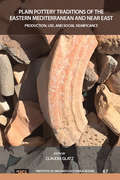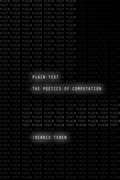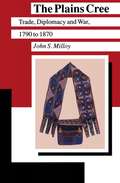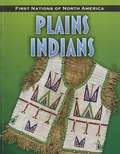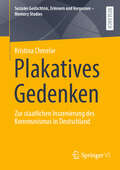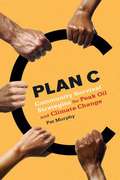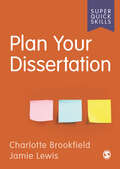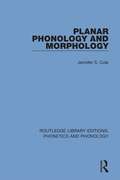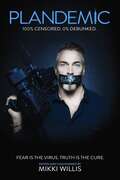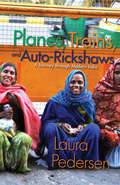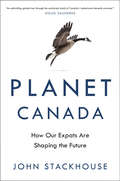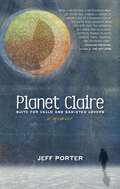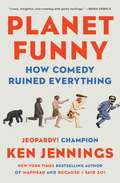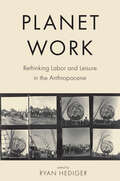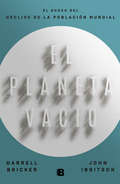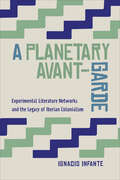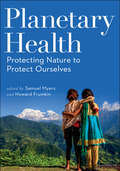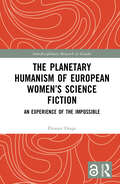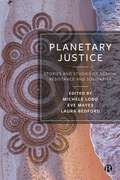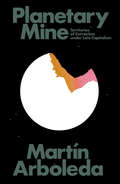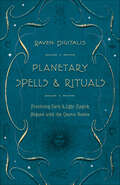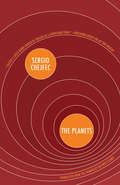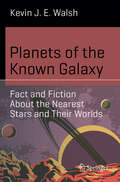- Table View
- List View
Plain Pottery Traditions of the Eastern Mediterranean and Near East: Production, Use, and Social Significance (UCL Institute of Archaeology Publications #67)
by Claudia GlatzThe evolution and proliferation of plain and predominantly wheel-made pottery presents a characteristic feature of the societies of the Near East and Eastern Mediterranean since the fourth millennium B.C. This plain pottery has received little detailed archaeological attention in comparison to aesthetically more pleasing and chronologically sensitive decorated traditions. Yet, their simplicity and standardization suggest they are products of craft specialists, the result of high-volume production, and therefore important in understanding the social systems in early complex societies. This volume-reevaluates the role and significance of plain pottery traditions from both historically specific perspectives and from a comparative point of view;-examines the uses and functions of this pottery in relation to social negotiation and group identity formation;-helps scholars understand cross-regional similarities in development and use.
Plain Text: The Poetics of Computation
by Dennis TenenThis book challenges the ways we read, write, store, and retrieve information in the digital age. Computers—from electronic books to smart phones—play an active role in our social lives. Our technological choices thus entail theoretical and political commitments. Dennis Tenen takes up today's strange enmeshing of humans, texts, and machines to argue that our most ingrained intuitions about texts are profoundly alienated from the physical contexts of their intellectual production. Drawing on a range of primary sources from both literary theory and software engineering, he makes a case for a more transparent practice of human–computer interaction. Plain Text is thus a rallying call, a frame of mind as much as a file format. It reminds us, ultimately, that our devices also encode specific modes of governance and control that must remain available to interpretation.
The Plains Cree: Trade, Diplomacy, and War, 1790 to 1870 (Manitoba Studies in Native History #4)
by John S. MilloyThe first economic, military, and diplomatic history of the Plains Cree from contact with the Europeans in the 1670s to the disappearance of the buffalo from Cree lands by the 1870s, focussing on military and trade relations between 1790 and 1870.Milloy describes three distinct eras, each characterized by a paramount motive for war--the wars of migration and territory, the horse wars during the 'golden years' of Plains Indian life, and buffalo wars, which mark the trail to the reserves. Intimately linked to each era was a particular trade pattern and a military system that linked the Cree with other Plains tribes and non-Natives. By tracing these themes, Milloy charts the ability of the Cree to serve their economic interests by forging alliances or undertaking military or diplomatic offensives.
Plains Indians (First Nations of North America)
by Andrew SantellaThis title teaches readers about the first people to live in the Plains region of North America. It discusses their culture, customs, ways of life, interactions with other settlers, and their lives today.
Plaintext: Essays
by Nancy MairsIn "Plaintext" -- an anthology of essays -- Mairs discusses in a lucid, coherent voice the realities of living with multiple sclerosis, her suicide attempts and depression and most importantly what she has learned. Five of the essays have previously been published elsewhere, while the other seven are original works discussing the changing roles of women in society.
Plakatives Gedenken: Zur staatlichen Inszenierung des Kommunismus in Deutschland (Soziales Gedächtnis, Erinnern und Vergessen – Memory Studies)
by Kristina ChmelarIm Fokus der Arbeit steht eine von der Bundesstiftung zur Aufarbeitung der SED-Diktatur federführend organisierte Jubiläumsausstellung. An dieser besonderen und gleichermaßen signifikanten Form staatlicher Geschichtspolitik interessiert vor allem das Wie der Darstellung des Kommunismus, wobei verschiedene sozialwissenschaftliche Abstraktionsebenen eingepreist werden. Zunächst entwickelt die Autorin eine kulturwissenschaftlich informierte und gleichsam für Politik sensible postkonstruktivistische Gedenkanalytik. Auf die zentrale Begrifflichkeit der Inszenierung zulaufend grundiert diese Analytik eine systematische Beschäftigung mit dem Zurschaustellungsprozess sowie mit der fertigen Schau. Bei der doppelten Dekonstruktion wird die Ausstellung in ihrer Multimedialität und -modalität ernstgenommen. Auch verschiedene Kontexte und Ambivalenzen finden Berücksichtigung. Am Ende kann die Fallstudie zeigen, dass die von der Bundesstiftung verfolgte, plakative geschichtspolitische Strategie in verschiedener Hinsicht problematisch ist. Den staatlich formulierten Anspruch, die innere Einheit des vereinigten Deutschlands mittels der Aufarbeitung des Kommunismus zu fördern und zu festigen, muss sie regelmäßig verfehlen.
Plan C: Community Survival Strategies for Peak Oil and Climate Change
by Pat MurphyA sustainability expert goes beyond renewables, calling on us to combat the climate crisis with a new, low-energy way of life.Concerns over climate change and energy depletion are increasing exponentially. Mainstream solutions still assume that some miracle will cure our climate ills without requiring us to change our energy-intensive lifestyle. But switching from fossil fuels to renewable energy sources isn’t enough. We need a Plan C.In response to the converging crises of Peak Oil, climate change, and increasing inequity, sustainability expert Pat Murphy offers an inspiring vision of community and curtailment. Where cooperation replaces competition, we can deliberately reduce consumption of consumer goods. Plan C shows how each person's individual choices can dramatically reduce CO2 emissions, offering specific strategies in the areas of food, transportation, and housing.
Plan Your Dissertation (Super Quick Skills)
by Jamie Lewis Charlotte BrookfieldPlanning your dissertation is made simple with this quick, step-by-step guide. Your instant pocket supervisor, this book will help you to: · Choose a topic you are excited about · Manage your time and beat procrastination · Create a step-by-step plan to keep you on track. Super Quick Skills provides the essential building blocks you need to succeed at university - fast. Packed with practical, positive advice on core academic and life skills, you’ll discover focused tips and strategies to use straight away. Whether it’s writing great essays, understanding referencing or managing your wellbeing, find out how to build good habits and progress your skills throughout your studies. Learn core skills quickly Apply them right away and see results Succeed in your studies and in life Super Quick Skills gives you the foundations you need to confidently navigate the ups and downs of university life.
Plan Your Dissertation (Super Quick Skills)
by Jamie Lewis Charlotte BrookfieldPlanning your dissertation is made simple with this quick, step-by-step guide. Your instant pocket supervisor, this book will help you to: · Choose a topic you are excited about · Manage your time and beat procrastination · Create a step-by-step plan to keep you on track. Super Quick Skills provides the essential building blocks you need to succeed at university - fast. Packed with practical, positive advice on core academic and life skills, you’ll discover focused tips and strategies to use straight away. Whether it’s writing great essays, understanding referencing or managing your wellbeing, find out how to build good habits and progress your skills throughout your studies. Learn core skills quickly Apply them right away and see results Succeed in your studies and in life Super Quick Skills gives you the foundations you need to confidently navigate the ups and downs of university life.
Planar Phonology and Morphology (Routledge Library Editions: Phonetics and Phonology #3)
by Jennifer S. ColeFirst published in 1991. In this study, the author investigates the proper treatment of harmony processes in phonological theory. The data examined lead to a formulation of morphologically governed harmony processes which involves multi-planar representations. The analysis of multi-planar harmony leads into a discussion of Plane Conflation and Bracket Erasure in Lexical Phonology. This title will be of great interest to students of linguistics.
Plandemic: Fear Is the Virus. Truth Is the Cure.
by Mikki WillisThe incredible true story of the most banned documentary in history. Researching the controversy arising after the release of the viral phenomenon known as Plandemic, the most seen and censored documentary in history, an investigative journalist sets out to disprove and debunk claims made throughout the film. Instead, the journalist opens a Pandora&’s box to witness firsthand an underworld of corruption, lies, and the darkest of unsolved mysteries. The result? A fascinating behind-the-scenes account about the making of Plandemic and Plandemic: Indoctornation; an exposé of the truth behind the origins of COVID-19; an alarming examination of individuals, such as Dr. Anthony Fauci and Bill Gates, and organizations like the CDC, NIH, WHO, and Bill & Melinda Gates Foundation, among others, driving the global vaccination agenda; and a look at the tech giant and mainstream media forces doing their utmost to silence and suppress the veracity of these findings. Investigative filmmaker Mikki Willis focuses his unflinching lens on two key subjects: virologist Dr. Judy Mikovits, who speaks frankly about the machinations for control and profit corrupting individuals and institutions tasked with overseeing public health; and Dr. David E. Martin, whose research and shocking data corroborate allegations of conflicts of interest. The US media and fact checkers condemned the two documentaries as &“dangerous conspiracy theory.&” Today, the two-part bombshell is being hailed globally for warning the world of the crimes against humanity that are just now being uncovered. From the death of his brother and mother due to bad medicine, to his awakening at Ground Zero on 9/11, Mikki Willis describes in detail the incredible life experiences that led him to risk his career and safety to create the Plandemic series.
Planes, Trains, and Auto-Rickshaws
by Laura Pedersen"It is Pedersen's gift to be able to draw the reader into her world." --Front Street Reviews "[Pedersen's] wicked, sarcastic, dry, self-deprecating sense of humor won me over and I absolutely loved it start to finish."--Printed Page, of Buffalo Gal India today is a nation caught between the rich heritage of its past and the great economic potential of its future. In this witty and insightful book, journalist and author Laura Pedersen reveals the tensions and contradictions facing the emerging world power. In particular, Pedersen explores the roles of women and children in India today, providing insight into this important and often neglected issue. Part travelogue, part history, and part cultural reflection, Planes, Trains, and Auto-Rickshaws provides an intimate glimpse of a nation at its turning point. It is a must-read for those who want to understand India beyond the headlines. Laura Pedersen has written for The New York Times and is the author of several books including Play Money, Going Away Party, Beginner's Luck (chosen as a Barnes & Noble Discover Great New Writers selection), Buffalo Gal, and Buffalo Unbound. In 1994 President Clinton honored her as one of Ten Outstanding Young Americans. She has appeared on Oprah, Good Morning America, Primetime Live, and The Late Show with David Letterman, and she writes for several well-known comedians. Pedersen lives in New York City.
Planet Canada: How Our Expats Are Shaping the Future
by John StackhouseA leading thinker on Canada's place in the world contends that our country's greatest untapped resource may bethe three million Canadians who don't live here.Entrepreneurs, educators, humanitarians: an entire province's worth of Canadian citizens live outside Canada. Some will return, others won't. But what they all share is the ability, and often the desire, to export Canadian values to a world sorely in need of them. And to act as ambassadors for Canada in industries and societies where diplomatic efforts find little traction. Surely a country with people as diverse as Canada's ought to plug itself into every corner of the globe. We don't, and sometimes not even when our expats are eager to help.Failing to put this desire to work, contends bestselling author and longtime foreign correspondent John Stackhouse, is a grave error for a small country whose voice is getting lost behind developing nations of rapidly increasing influence. The soft power we once boasted is getting softer, but we have an unparalleled resource, if we choose to use it. To ensure Canada's place in the world, Stackhouse argues in Planet Canada, we need this exceptional province of expats and their special claim on the twenty-first century.
Planet Claire: Suite For Cello And Sad-eyed Lovers
by Jeff PorterThe second installment in Ann Hood's Gracie Belle imprint challenges the traditional solemnity that characterizes nonfiction books of grief, loss, and sorrow. ”Few readers will fail to be gripped by this tragically common story about death and
Planet Funny: How Comedy Took Over Our Culture
by Ken JenningsA Kirkus Reviews Best Book of the Year The witty and exuberant New York Times bestselling author and record-setting Jeopardy! champion Ken Jennings relays the history of humor in &“lively, insightful, and crawling with goofy factlings,&” (Maria Semple, author of Where&’d You Go Bernadette)—from fart jokes on clay Sumerian tablets to the latest Twitter gags and Facebook memes.Where once society&’s most coveted trait might have been strength or intelligence or honor, today, in a clear sign of evolution sliding off the trails, it is being funny. Yes, funniness. Consider: Super Bowl commercials don&’t try to sell you anymore; they try to make you laugh. Airline safety tutorials—those terrifying laminated cards about the possibilities of fire, explosion, depressurization, and drowning—have been replaced by joke-filled videos with multimillion-dollar budgets and dance routines. Thanks to social media, we now have a whole Twitterverse of amateur comedians riffing around the world at all hours of the day—and many of them even get popular enough online to go pro and take over TV. In his &“smartly structured, soundly argued, and yes—pretty darn funny&” (Booklist, starred review) Planet Funny, Ken Jennings explores this brave new comedic world and what it means—or doesn&’t—to be funny in it now. Tracing the evolution of humor from the caveman days to the bawdy middle-class antics of Chaucer to Monty Python&’s game-changing silliness to the fast-paced meta-humor of The Simpsons, Jennings explains how we built our humor-saturated modern age, where lots of us get our news from comedy shows and a comic figure can even be elected President of the United States purely on showmanship. &“Fascinating, entertaining and—I&’m being dead serious here—important&” (A.J. Jacobs, author of The Year of Living Biblically), Planet Funny is a full taxonomy of what spawned and defines the modern sense of humor.
Planet Work: Rethinking Labor and Leisure in the Anthropocene
by Ryan Hediger David Rodland Ted Geier Sinan Akilli Daniel Clausen James Armstrong Matt Wanat Amanda Adams Jennifer K. Ladino Will Elliot Kevin Maier Jo Rey Sharon O'DairLabor and labor norms orient much of contemporary life, organizing our days and years and driving planetary environmental change. Yet, labor, as a foundational set of values and practices, has not been sufficiently interrogated in the context of the environmental humanities for its profound role in climate change and other crises. This collection of essays demonstrates the urgent need to rethink models and customs of labor and leisure in the Anthropocene. Recognizing the grave traumas and hazards plaguing planet Earth, contributors expose fundamental flaws in ideas of work and search for ways to redirect cultures toward more sustainable modes of life. These essays evaluate Anthropocene frames of interpretation, dramatize problems and potentials in regimes of labor, and explore leisure practices such as walking and storytelling as modes of recasting life, while a coda advocates reviving notions of work as craft.
El planeta vacío: El shock del declive de la población mundial
by Darrell Bricker John IbbitsonBienvenidos a la caída de la población mundial. Durante medio siglo, muchos estadistas, políticos, analistas y estudiosos han alertado sobre una explosión demográfica que pondrá en jaque los recursos del planeta. Sin embargo, un creciente número de expertos tiene en el punto de mira otro motivo de alarma: en lugar de aumentar exponencialmente, la población mundial se encamina hacia un fuerte descenso que ya es evidente en muchos lugares. En El planeta vacío, los autores revelan cómo esta caída de la población traerá consigo distintos beneficios: el riesgo de hambrunas disminuirá, la situación medioambiental mejorará, menos trabajadores exigirán mejores salarios y unas tasas de natalidad más bajas representarán mayores ingresos y autonomía para las mujeres. Pero no todo son buenas noticias. Ya podemos ver los efectos del envejecimiento de la población en Europa y algunos puntos de Asia, y cómo la escasez de trabajadores debilita la economía e impone unas exigencias desmesuradas en el campo de la salud pública. Reseñas...«Si bien el género "todo lo que sabes es falso" se ha vuelto agotador, este libro contiene información fascinante y de vital importancia. Los datos reveladores de Bricker e Ibbitson demuestran, con una prosa enérgica e incisiva, que en el mundo se está operando un cambio radical sin que nadie se dé cuenta.»Steven Pinker «Aun cuando la población mundial esté aumentando, la tasa de natalidad ya ha empezado a caer en todo el mundo. En otros tiempos, los descensos de población se debieron a desastres naturales como la erupción del Toba, la peste negra o la gripe, pero la caída que viene ahora será cosa exclusivamente nuestra. En este sugerente libro, Bricker e Ibbitson debaten acerca de por qué, hacia finales del siglo XXI, no habrá una superpoblación global sino una rápida disminución demográfica, al tiempo que proponen medios para adaptarnos a ella.»Lewis Dartnell, profesor de comunicación científica en la Universidad de Westminster y autor de Abrir en caso de apocalipsis «Para comprender el futuro debemos cuestionar nuestras suposiciones, y la mayor de todas es que la población sigue creciendo, algo que muchos creemos. Bricker e Ibbitson nos ofrecen un desafío revelador, que debería ser tomado muy en serio por todo aquel que se preocupe por el futuro a largo plazo (que, espero, seamos todos).»Dan Gardner, autor de Risk y coautor de Superforecasting: The Art and Science of Prediction «Un libro muy ameno, una visión controvertida sobre una realidad sobre la que se reflexiona poco: un mundo despoblado y una urbanización creciente.»George Magnus, autor de The Age of Aging y Red Flags: Why Xi's China Is in Jeopardy
A Planetary Avant-Garde: Experimental Literature Networks and the Legacy of Iberian Colonialism (Toronto Iberic #81)
by Ignacio InfanteA Planetary Avant-Garde explores how experimental poetics and literature networks have aesthetically and politically responded to the legacy of Iberian colonialism across the world. The book examines avant-garde responses to Spanish and Portuguese imperialism across Europe, Latin America, West Africa, and Southeast Asia between 1909 and 1929. Ignacio Infante critically traces the hegemony and resistance to the colonial regimes of Spain and Portugal across particular avant-garde networks, expanding our understanding of Western colonial and imperial ideologies of the early twentieth century. The book extends geopolitical dimensions of the historical avant-garde into a wider transnational and planetary framework, including divergent experiences of modernity, forms of experimental poetics, and understandings of history. It sheds light on topics, such as the relation between Portuguese futurism and European colonialism in West Africa, the Latin American avant-garde’s critique of European historicism, the development of Brazilian modernism in relation to the European avant-garde, the comparative poetics of modernism in the Philippines, and the 1929 Barcelona World’s Fair. Grounded in extensive archival research, A Planetary Avant-Garde provides a new understanding of the historical avant-garde from a global and multilingual perspective.
Planetary Health: Protecting Nature to Protect Ourselves
by Howard Frumkin Samuel MyersHuman health depends on the health of the planet. Earth's natural systems—the air, the water, the biodiversity, the climate—are our life support systems. Yet climate change, biodiversity loss, scarcity of land and freshwater, pollution and other threats are degrading these systems. The emerging field of planetary health aims to understand how these changes threaten our health and how to protect ourselves and the rest of the biosphere.Planetary Health: Protecting Nature to Protect Ourselves provides a readable introduction to this new paradigm. With an interdisciplinary approach, the book addresses a wide range of health impacts felt in the Anthropocene, including food and nutrition, infectious disease, non-communicable disease, dislocation and conflict, and mental health. It also presents strategies to combat environmental changes and its ill-effects, such as controlling toxic exposures, investing in clean energy, improving urban design, and more. Chapters are authored by widely recognized experts.The result is a comprehensive and optimistic overview of a growing field that is being adopted by researchers and universities around the world. Students of public health will gain a solid grounding in the new challenges their profession must confront, while those in the environmental sciences, agriculture, the design professions, and other fields will become familiar with the human consequences of planetary changes. Understanding how our changing environment affects our health is increasingly critical to a variety of disciplines and professions. Planetary Health is the definitive guide to this vital field.
The Planetary Humanism of European Women’s Science Fiction: An Experience of the Impossible (Interdisciplinary Research in Gender)
by Eleanor DrageThe Planetary Humanism of European Women’s Science Fiction argues that utopian science fiction written by European women has, since the seventeenth century, played an important role in exploring the racial and gender possibilities of the outer limits of the humanist imagination. This book focuses on six works of science fiction from the UK, France, Spain, and Italy: Jennifer Marie Brissett’s Elysium; Nicoletta Vallorani’s Sulla Sabbia di Sur and Il Cuore Finto di DR; Aliette de Bodard’s Xuya Universe series; Elia Barcelo’s Consecuencias Naturales; and Historias del Crazy Bar, a collection of stories by Lola Robles and Maria Concepcion Regueiro. It sets these in conversation with key gender and critical race scholars: Judith Butler, Rosi Braidotti, Gayatri Chakravorty Spivak, Paul Gilroy, and Jack Halberstam. It asserts that a key concern for feminism, anti- racism, and science fiction now is to seek inventive ways of returning to the question of the human in the context of increasing racial and gender divisions. Offering unique access to contemporary and historical women writers who have mobilised the utopian imagination to rethink the human, this book is of use to those conducting research in Gender Studies, Philosophy, History, and Literature.
Planetary Justice: Stories and Studies of Action, Resistance and Solidarity
by Kuntala Lahiri-Dutt Jenia Mukherjee Yin Paradies Aditya Ghosh Kalyan Rudra Amrita Sen Anwesha Haldar Lakshminarayan Satpati Sharon Stein Marlies Kustatscher Anne Poelina Aleryk Fricker Natasha Abhayawickrama Alex Baird Robin A Bellingham Sanjana Dutt Souvik Lal Chakraborty Beth Christie Alicia Flynn Naomi Godden Lowell Hunter Callum McGregor Ruchira Talukdar Dani Villafaña Bill Webb Sandra Wooltorton Julian S. YatesAvailable open access digitally under CC-BY-NC-ND licence. Bringing together interdisciplinary climate change scholarship and grassroots activism, this book considers the possibilities of planetary justice across human difference, generations, species and the concept of life and non-life. Writing amidst bushfires, cyclones, global climate strikes and a global pandemic, contributors from the Earth Unbound Collective share stories from India, Australia, Canada and Scotland. Chapters draw on Indigenous, Black, Southern, ecosocialist and ecofeminist perspectives to call for more radical and interconnected ideas of justice and solidarity. This accessible book features diverse voices that speak with the planet in the face of climate change, biodiversity loss and extinction. It explores the politics and practices of working towards a future where the planet thrives.
Planetary Mine: Territories of Extraction under Late Capitalism
by Martin ArboledaA clarion call to rethink natural resource extraction beyond the extractive industriesPlanetary Mine rethinks the politics and territoriality of resource extraction, especially as the mining industry becomes reorganized in the form of logistical networks, and East Asian economies emerge as the new pivot of the capitalist world-system. Through an exploration of the ways in which mines in the Atacama Desert of Chile—the driest in the world—have become intermingled with an expanding constellation of megacities, ports, banks, and factories across East Asia, the book rethinks uneven geographical development in the era of supply chain capitalism. Arguing that extraction entails much more than the mere spatiality of mine shafts and pits, Planetary Mine points towards the expanding webs of infrastructure, of labor, of finance, and of struggle, that drive resource-based industries in the twenty-first century.
Planetary Spells & Rituals: Practicing Dark & Light Magick Aligned with the Cosmic Bodies
by Raven DigitalisAn extension of every Witch's spirituality, spellcraft is a vital tool for sparking significant life change. And when you attune your magick to planetary energies, it becomes infinitely more powerful. Organized by the Sun, Moon, and planets, each of the 55 spells and rituals in this book are aligned according to astrological energies and designed to be easily customized for your specific intention and unique spiritual path. From personal growth to practical concerns, you'll find a rich variety of dark and light magickal workings for every purpose:GlamouryHealing childhood woundsRevealing truthHalting gossipAttracting loveMending quarrelsBanishing heartacheEnding addictionsCursing a violatorBreaking a curseCord-cuttingSummoning ancestorsGuiding the dead and dyingWeather magickProphetic dreamingScryingSpiritual rebirthPast-life regressionIncluded is a list of zodiacal and astrological correspondences—Sun sign, Moon sign, day of the week, mythical archetypes, themes, and more—to help you determine the best times to work magick.Praise: "Masterful and compassionate...Planetary Spells & Rituals provides food for thought, spells and rituals for use, and is a welcome, much-needed addition to any spellcaster's bookshelf."—Judika Illes, author of The Encyclopedia of 5,000 Spells"Planetary Spells & Rituals is an urban, modern, and cutting-edge manual for those willing to explore the layers of magickal possibility within. Raven expresses the essence of the Craft in a clear way, and balance is a great theme of this book. The framework of Planetary Spells is quite informative for those seeking some strong workings to bring forth realistic results."—Michael W. Ford, Author of Luciferian Witchcraft and The Bible of the Adversary"Unlike most spellbooks, which focus on the moon, Planetary Spells & Rituals places major importance on zodiacal and planetary influences, with the power of the sun playing a pivotal role. Eclectic and unusual spells are accompanied by sensible explanations of how spells work and how to cast them well. As always, Raven takes an old standard and makes it new and fresh, with a magickal approach all his own."—Deborah Blake, author of The Everyday Witch A to Z Spellbook and The Goddess is in the Details"With his usual depth, clarity, and highly readable style, Raven Digitalis reveals yet another layer we can add to our magic's efficacy and power—perfect timing! This, in addition to many creative and practical ideas for spellwork, renders Planetary Spells & Rituals a must-have for any Witchy library."—Thuri Calafia, author of Dedicant: A Witch's Circle of Fire"With great understanding Raven takes his readers into previously uncharted territory as Planetary Spells dives deep into the nuances of astrology, dark and light magick, and weaves together a unique and much-needed volume explaining the connections between them."—Corvis Nocturnum, author of Embracing the Darkness, Understanding Dark Subcultures, and Allure of the Vampire; Our Sexual Attraction to the Undead
The Planets
by Sergio Chejfec Heather ClearyWhen he reads about a mysterious explosion, the narrator's thoughts turn to his disappeared childhood friend, M, who was abducted during a spasm of political violence in Buenos Aires in the early 1970s. He convinces himself that M must have died in this explosion, and he begins to tell the story of their friendship through a series interconnected vignettes.
Planets of the Known Galaxy: Fact and Fiction About the Nearest Stars and Their Worlds (Science and Fiction)
by Kevin J. WalshThis book offers a tour of “the known galaxy”, here defined as the region of interstellar space closest to Earth. The phrase “the known galaxy” has a particular resonance in science fiction, as it refers to the part of the Milky Way that from the perspective of a point in time centuries from now may have been explored and settled by human beings. In the known galaxy, there are gloomy ocean worlds illuminated by the light of exploding stars. There are worlds where precious gems could be as common as pebbles. There are planets eternally wandering between the stars like the Flying Dutchman. There are lava worlds, steam worlds, hot Jupiters, cold Jupiters and maybe even worlds like our Earth. The purpose of the book is to begin to give this region a sense of place, in the same way that Mars is now starting to be appreciated as a location rather than just a planet. In doing so, the book merges our current scientific knowledge of the known galaxy with speculative fiction and with older legends and myths.A sense of place is the feeling that some locations have a special meaning. This emotional connection arises from a combination of cultural and environmental factors that make individuals care about a particular place. It is challenging to create a sense of place for distant locations that no human has visited and for which our current knowledge is limited. This book attempts to take a step in this direction, by dividing the known galaxy into a number of clearly described distinct regions, by providing scientific descriptions of the likely environmental conditions on the known planets of these regions, and by linking these planets to their literary and mythological context.The book is aimed at fans of both science fact and science fiction. It combines a tour of real planets outside of our solar system with tales of their fictional counterparts. The combination of solid scientific facts and analysis with speculation and imagination will be appealing to readers who want to gain a feeling for these planets as places with a back story, rather than just as names somewhere out there in the sky.
